| Numinous The Music of Joseph C. Phillips Jr. |
The Numinosum Blog
 Last night, March 26th, I attended the New England Conservatory's Vocal Showcase at Joe's Pub. This was part of NEC's week-long celebration, Hot and Cool-40 years of Jazz at NEC. Now while I did not attend NEC, I was interested in this particular concert because it featured so many incredible singers I work with. Two-thirds of the featured singers on the Joe's Pub concert (Amy Cervini, Sara Serpa, Jo Lawry, Sofia Rei Koutsovitis) also sing with Numinous. In addition, with other fabulous NEC singing alums and Numinous singers such as Monika Heidemann, Wendy Gilles (both of whom attended the concert but did not sing on the concert) and Julie Hardy as well as another NEC alum and Numinous member, Carmen Staaf, rounding out the piano chair for the night, frankly, I probably should have been on the NEC guest list! Anyway, why do many of the singers I use come from NEC? Well, besides being wonderful musicians and composers with distinct styles and characters of their own, one hint to the answer to that question is certainly who they studied with: Dominique Eade. The jazz vocal guru at NEC since 1984 as well as a private teacher in New York City, she has also taught and mentored Luciana Souza, Kate McGarry, Roberta Gambarini and many of jazz's most dynamic singers. Ms. Eade showed she is an assured and impressive talent-deserving-wider-attention herself with a performance of two songs at the end of the evening. First was her own composition, "Chasing the Setting Sun" which was an a cappella, mostly wordless improvisatorial tour-de-force that was 'Bobby McFerrin meets Meredith Monk'-like in its rhythmic and percussive sounds that vertiginously tumbled through the space and had the entire audience enraptured. Second was her quiet reading of the standard, "Body and Soul" which mostly showcased the subtle talents of the rhythm section, all alums of NEC as well: the aforementioned Carmen Staaf on piano, Jorge Roeder on bass, and Richie Barshay on drums. Ms. Eade's singing was supple, powerful, and wonderful and one could tell right from the first sounds from her mouth, that she is no typical 'jazz' singer. All sorts of music informs her distinct style and I think this would definitely make an impression on anyone that studies with her. As Amy said from stage during one of the breaks between singers, "you can probably hear a little bit of Dominique in every singer tonight." And while each of the former students are coming from different perspectives and backgrounds, this statement became readily apparent as you listened to each sing. The night opened in an almost familial tone as David "Mark Murphy" Devoe (the nickname stems from a statement he made on stage), a doctoral candidate at NEC, singing a mostly straight-ahead tune and displaying some nice scat chops. Sara Serpa then sang a beautiful original composition, "Space" which had a lovely compositional arc and featured Sara's sinuously melodic and soaring wordless improvisation. Amy Cervini was next with a pitch-perfect and fun rendition of Nellie McKay's "I Wanna Get Married." All of 8-months pregnant and singing lyrics such as, "I need to cook meals/I want to pack you little lunches/for my Brady Bunches/then read Danielle Steele," Amy interpreted the song with a savory amount of tongue-and-cheek humor and earnest wistfulness. Sofia Rei Koutsovitis sang a song in Spanish which utilized vocal electronic delay and live sampling of her own voice to set-up a weaving pattern of voices which was an effective and sometimes almost ghostly result. Patrice Williamson came on next to sing "Close Your Eyes," the most straight-ahead tune of the evening. Here she let loose with some fine scat singing and the rhythm section was able to stretch their own swinging muscles. Jo Lawry, another doctoral candidate who is temporarily putting off the degree to tour with Sting (yes, THAT Sting) this summer, came on with her harmonium and tastefully sang the lovely composition "Palhaço." Portuguese for 'clown,' the song was originally a solo guitar piece that Jo wrote lyrics to by the unheralded (sadly in the US, that is) composer and guitarist from Brazil, Egberto Gismonti. Then David, Sara, Amy, Sofia, Patrice, and Jo all filled the stage to perform an original composition by Dominique Eade. The song both opened and ended with more choral-like a cappella sections, however the middle section was where the meat was, so to speak: a faintly Middle Eastern-like groove established by overlapping little motifs in the voices as well as hand claps and hand percussion, all laid the rhythmic foundation for each singer to individually improvise over. Here each singer's approach and personality came through in their solos; some more deliciously tonally exploratory and melodic (Jo, Sara) or more extrovertedly joyous (Sofia, Amy) or more jazzy-like (Patrice, David), and was a great lead-in for Dominique Eade's previously mentioned two songs that closed the evening. The advertising tag-line to the NEC's Jazz at 40 celebration is "Don't stay home" and with last night's showcase concert at Joe's Pub, I'm glad I didn't. POSTED BY NUMINOUS AT 3:08 PM
0 Comments
While I have been in bands since I was well under 5 feet tall, I've never actually attended band camp (although I was a worker at a DCI camp during one summer week in college but that's another story!). Despite this obvious deficit of culture, I have managed to soldier on in my musical life. Not so the vast majority of people who after years in band during their 'wonder years', no longer have any connection to such formative musical experiences. Sure you can go to almost any school district in the United States and if the music program hasn't been cut, you'll find many wonderful student, university, and community bands. And you CAN get your band fix that way. But really, how often do you get to hear an actual PROFESSIONAL wind ensemble perform!? If you live in Dallas, with the Dallas Wind Symphony, or in Tokyo, with the Tokyo Kosei Wind Symphony,ok, you might have some chance, but in New York City? Fuggedaboutit! ...until now!
Come out nextWednesday, March 31st to hear the New York City area's own home-grown wind ensemble, the Gotham Wind Symphony perform. Under the direction of Mike Christianson, the GWS features many of New York City's most talented and versatile musicians, including some Numinous members. The concert will take place at the Brooklyn Lyceum (227 4th Avenue in Park Slope, Brooklyn; literally above the M, R subway train stop), with two sets at 8:00pm and 9:30pm ($10). The program Mike has put together for the show will include: Thad Jones- Northwest Suite Joseph Haydn- Divertimento #1 Joseph C. Phillips, Jr.- The Gates of the Wonder-World Open Gustav Holst- Second Suite for Military Band in F John Hollenbeck- eternal interlude Frederick Delibes/Gil Evans- Maids of Cadiz Percy Grainger- Molly On The Shore Astor Piazolla/James Chirillo- Pulsacion #1 John Philip Sousa- Glory of the Yankee Navy Regular readers might notice that the piece of mine the GWS is performing is the NYC premiere of the same composition commissioned for and premiered at the University of Maryland last year in celebration of their 100 years of band. With some of the famous band conductors living long lives (William Revelli-92 years; Frederick Fennell-90 years), it proves that listening to band music can prolong your life. So come out next Wednesday March 31st to the Brooklyn Lyceum and extend your life by a few hours; you won't regret it... POSTED BY NUMINOUS AT 8:55 PM Wow, this recent article from The Nation, retweeted around the Twitterverse, about the undercaste of African-Americans created by the drug 'war,' brought up many thoughts. For example: Instead of attacking real issues and problems and the subsequent hard and messy work it takes to solve them, we, as a society, often grapple with the appearance of progress, the appearance of doing the right thing. What happened to "ask not what your country can do for you?" To hard work? To sacrifice? To compromise and that good ole fashion kindergarten value: sharing? To a sense of respect, of self and of the other? To a sense of 'us' not a mantra of 'whatever I can get for me and mines?' While there is much anger and distrust and despair, there is still also so much beauty and goodness and hope too. Although it is hard not to wonder that, with respect to Malcolm X's memorable line in Spike Lee's eponymous film, America is one of the best ideas humans ever had; intolerance ruined it.
POSTED BY NUMINOUS AT 6:04 PM 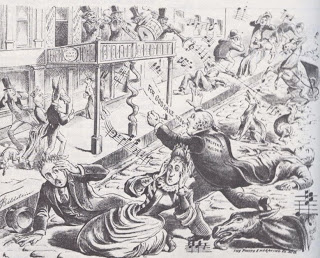 The next Composer Salon is on Monday March 15th, 2010 from 7 pm to around 9 pm at the Brooklyn Lyceum (227 4th Avenue in Park Slope, Brooklyn). And the price is right: FREE! The Lyceum is literally above the Union Street M, R Train stop in Brooklyn. The Lyceum does have various inexpensive libations including different beers, wine and other non-alcoholic beverages, as well as coffee and baked goods. If you are a composer/musician in New York City area, regardless of genre, style, or inclination, I hope you can come out, meet some new and old faces behind the blogs and comments and listen or join the discussion, which often branches out from the original topic (at the end of this post are links to previous Salon topics as well as an article on NPR's A Blog Supreme about a recent Salon-don't worry, this next one will be a bit warmer than the last!). Salon Topic #5: "Music is the universal language of mankind."-Henry Wadsworth Longfellow What is communicating meaning in music? Is music's meaning defined by how it is used, borrowing an idea of Ludwig Wittgenstein? Music in a film, is film music; if it is played at Birdland or the Village Vanguard, it is jazz; if the New York Philharmonic plays it, it must be classical, etc. Or does music mean little more than sounds in time, as Igor Stravinsky writes in his An Autobiography, "I consider that music is, by its very nature, essentially powerless to express anything at all, whether a feeling, an attitude of mind, or psychological mood, a phenomenon of nature, etc….Expression has never been an inherent property of music. That is by no means the purpose of its existence." For that matter what do the labeling of music convey and mean? When someone says 'classical music' or 'jazz' (or 'anti-jazz') or alternative, what does that even mean? While many of today's composers and musicians eschew labels and genres, many others often proudly define themselves by choice: jazz composer, classical musician, rock band, rapper, etc. And when they don't define their music explicitly, their associations often betray their proclivities. Isn't one of the first questions a musician is asked when introduced to a non-musician is, well what kind of music do you write/play? Doesn't that answer affect what someone thinks about your music (and you)? Once someone knows what kind of music you write/play, accurately or not, they feel they understand it (you) and they know what it (you) means. So what does labeling one's self mean to one's music? If "music is music," as Alban Berg said to George Gershwin when Mr. 'Fascinating Rhythm' was hesitant to play piano for Mr. 'Wozzeck' on their first meeting, then why self-select a genre? Many a sensitive and creative artist wants to communicate and connect with the public. Which often translates into conveying a particular meaning to our work (whether we make that meaning explicit or not). However what happens when the listener (consumer) takes another meaning away from our work? Is this valid? Should we clarify to the public our objectives toward what the work means so as not to be misunderstood? Or should we just write and play, and let the meaning come what may. After-all, as T.S. Eliot said, “Great art can communicate before it is understood.” I. What does music mean? This evocative question was the title of Leonard Bernstein’s first televised New York Philharmonic Young People’s Concert in the late 1950’s. Fifteen years after that first concert, the third of Bernstein’s six Norton Lectures at Harvard University asked this same question. Brilliantly comparing the musical language to some of the ideas of linguistic theory, specifically Noam Chomsky’s universal and transformational grammar, Bernstein says, “Music has intrinsic meanings of its own, which are not to be confused with specific feelings or moods, and certainly not with pictorial impressions and stories. These intrinsic musical meanings are generated by a constant stream of [musical, extrinsic, and analogical] metaphors…” While not quite as rigid as Igor Stravinsky’s famous saying that music has no meaning (“music’s exclusive function is to structure the flow of time and to keep order in it”), Bernstein’s definition is similar to Aaron Copland’s position in What to Listen For in Music, “all music has an expressive power… all music has a certain meaning behind the notes… [the music] may even express a state of meaning for which there exists no adequate word in any language.” What does music express to you? What particular musical metaphors do you use to help the listener hear what you are trying to say in your compositions? What sparks the genesis of a composition for you-is it purely manipulating musical ideas, concrete extra-musical associations, and/or metaphorical expression? All of the above? II. Music, like language, is about and has always been about communication. From the performer/creator, some meaning and/or expression is transferred to the listener through, what 19th century music critic Eduard Hanslick calls “sonorous forms in motion”. Often what is transferred to the listener is not particularly definable or if it is, it is often not particularly what the performer/creator had in mind while creating the work. In the wonderful book (which I've recommended before) New Voices-American Composers Talk about their Music (Amadeus Press, 1995) Laurie Anderson speaking about communicating ideas to her audience says, “…to me the richer the image is, the better. By richer I mean clearer. It has no obstructions, it gets right across and people can understand it…I’ve chosen to be an artist and half of that, at least is in the communication of it.” She goes on later in the interview to say, “And I feel that the work has really succeeded when somebody says, ‘I saw or heard your piece and I got so many ideas from it’. Then they tell me what the ideas were, and they’ve nothing to do with what I was doing. That suggests to me that the piece was rich enough for them to take something from it and do what they wanted.” How do you insure that your compositions are clear to you? To the listener? If you feel your compositions present understandable ideas/feelings/expressions, is it successful if it conveys to the listener ideas/feelings/expressions entirely different from your original intent? Is this important to you? If you are a composer or musician or music lover in the New York City area, consider coming down to the Lyceum and joining the discussion, or if you don't live in New York or can't make it, adding your thoughts in the comments. Hope to see you on March 15th! Previous Composer Salons Composer Salon #1: The Audience Composer Salon #2: Future Past Present Composer Salon #3: Mixed Music-Stylistic Freedom in the 'aughts Composer Salon #4: Inspiration (also here's a NPR A Blog Supreme article about the Salon) (Photo credits: public domain image from the cover of the newspaper The Mascot from http://www.kimballtrombone.com/) POSTED BY NUMINOUS AT 8:18 PM I just came across this brief interview of one of my favorite composers Arvo Pärt, conducted by one of my favorite musicians, Björk. Hearing Pärt, with his halting English, give a tiny insight into his thoughts on music was serenely fascinating. But one lingering question: is it just me or at times does it sound like Björk could have come from Glasgow? Seriously, nonetheless worth checking it out for the Pärt fan. BTW, the title refers to a question of Björk's around 3:30 in the video. Pärt's answer is both kind, serious, and illuminating). Choice Pärt quotes from the video: "You can kill people with sound...and if you can kill, maybe there is the sound that is the opposite of killing." "In art, everything is possible, but everything [what is made] is not necessary." POSTED BY NUMINOUS AT 5:53 PM All we care about is runway models, Cadillacs, and liquor bottles, Give me something I wanna be Retro glamour, Hollywood Yes, we live for the Fame, Doin' it for the fame. -The Lady Gaga of Germanotta Well just got the official word, that we are going to the Apollo! As I mentioned in a previous post in January, our PS 321 Faculty Band auditioned for our shot of teacherdom glory at the New York Department of Education's Talent Night at the historic Apollo Theater. And, we made it! Wednesday June 2, 2010 at 7:30pm is showtime; where we will have 3 minutes on the legendary stage to get our collective groove on. So mark those calenders now...more details to follow.
POSTED BY NUMINOUS AT 7:43 PM |
The NuminosumTo all things that create a sense of wonder and beauty that inspires and enlightens. Categories
All
|
Thanks and credit to all the original photos on this website to: David Andrako, Concrete Temple Theatre, Marcy Begian, Mark Elzey, Ed Lefkowicz, Donald Martinez, Kimberly McCollum, Geoff Ogle, Joseph C. Phillips Jr., Daniel Wolf-courtesy of Roulette, Andrew Robertson, Viscena Photography, Jennifer Kang, Carolyn Wolf, Mark Elzey, Karen Wise, Numinosito. The Numinous Changing Same album design artwork by DM Stith. The Numinous The Grey Land album design and artwork by Brock Lefferts. Contact for photo credit and information on specific images.
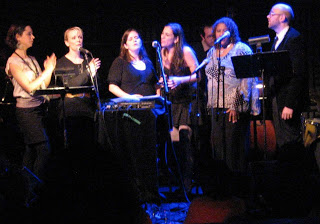
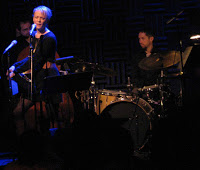
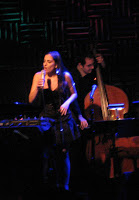
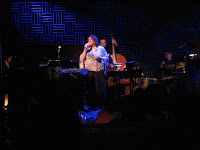
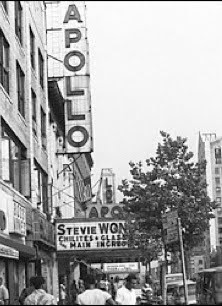
 RSS Feed
RSS Feed